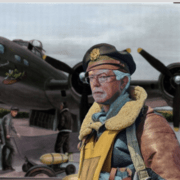|
buglord posted:I'm at a segment in my audiobook where the conversation went to the Nazi branches of the armed forces. Apparently they didn't work so harmoniously and event went as far to sabotage eachother? And contrary to what I thought, not only did nazis plunder, but they thought of that as a substitution for sustaining the axis throughout the war? To some degree I've heard the same, but it was nothing like Japan's hilarious inter-service squabbling.
|
|
|
|

|
| # ? Apr 25, 2024 07:55 |
|
buglord posted:I'm at a segment in my audiobook where the conversation went to the Nazi branches of the armed forces. Apparently they didn't work so harmoniously and event went as far to sabotage eachother? And contrary to what I thought, not only did nazis plunder, but they thought of that as a substitution for sustaining the axis throughout the war? That's not just limited to the Nazis, either - the two branches of the Imperial Japanese military hated each other even more, often outright refusing to cooperate. Inter-service rivalries are common, as different branches squabble over resources and fight to define the country's strategic priorities, but it was worse in Germany and Japan due to the way things were led. In Germany, Hitler liked to purposely set up vague high-level command structures and let various officials squabble and compete against each other to win his favor - it often caused chaos for the lower-level officials and officers, but kept all the high-ranking folks too busy scheming against each other to scheme against Hitler. In Japan, it was even worse because the country was essentially run by the military; there wasn't really anyone with the authority to tell them to cut it out, and anyone who tried was likely to end up assassinated at the hands of some overenthusiastic junior officer (poo poo was wild in Imperial Japan).
|
|
|
|
Yeah, there's many examples in history of countries where the military became a state within the state, but Imperial Japan is the only one I know of where the military became two states within the state.
|
|
|
|
Edgar Allen Ho posted:People tend to only talk about tanks and planes and not the absolutely enormous amounts of industrial and logistical supplies. Perhaps they didn't turn the tide but that certainly helped save time and soviet lives. You can't do Bagration without trucks and fuel and boots and trains. Ron Jeremy posted:Knowing about the different guages of Russian and German rail. That isn't fair because that was an actual problem and logistics you say? Supplying War: Logistics from Wallenstein to Patton 2nd Edition It talks a bit about German operations in Russia, June-December 1941, the North AFrican Thearte with Rommel, and the Allies advance towards Germany. AmyL fucked around with this message at 19:16 on Aug 19, 2017 |
|
|
|
axeil posted:This book on the rise of Nazis in a small German town I think would make a very good reading recommendation: https://www.amazon.com/Blitzed-Drugs-Germany-Norman-Ohler/dp/0241256992  This was also incredibly good book about drugs in Nazi Germany. Also details the personal relation of Hitler with his dealer and personal physician Theodor Morell, and exactly what complete junkie the A-man was. It's also darkly funny, although that might just be me finding Nazis funny to begin with.
|
|
|
|
lollontee posted:https://www.amazon.com/Blitzed-Drugs-Germany-Norman-Ohler/dp/0241256992 Yeah, that's a pretty cool book. I went to a kind of book tour event at my library when the author was in town. Seemed like a pretty cool guy and he had many interesting things to say about doing research for the book, but what I remember most was the little tidbit about Himmler who was practically the only one in the inner circle not to have been hooked up with a bunch of quack remedies from Doc Morell, instead it was noted that he spent something like 3 hours every morning doing yoga.
|
|
|
|
buglord posted:Lately I’ve been listening to an audiobook called The Nuremberg Trials by Ann and John Tusa. I initially picked it up because I dont know how you can attempt to make a not-show-trial while also trying to make a legal precedent for the future by making some examples out of Nazis. While the book is pretty informative so far (and also a really entertaining listen), its just adding more and more complexity to something which was already pretty confusing. Like, there was about 7-8 hours of background information before the book discussed the first day of the trial. I'm near the end of this book, and I think it's worth it just to go into how each of the defendants did their case. You see some that really tried, you see Hess, who was uhhhhhhh, and then Keitel who was an idiot.
|
|
|
|
Panzeh posted:I'm near the end of this book, and I think it's worth it just to go into how each of the defendants did their case. You see some that really tried, you see Hess, who was uhhhhhhh, and then Keitel who was an idiot. The book despite how much I liked it had some really boring parts for me. In its defense, the trial had some really boring parts for observers at the time too. But there was this 4-5 hour slog where the "lesser" defendants, like Nazi industrialists, became the focus. Following the ringleaders, they employed the same tactics that everyone else did "I didn't know it was happening/I was just obeying orders/Versailles made us do it/Hitler & Himmler made us do it". I don't know how the judges put up with that the 20th time without completely going bonkers. Except Jackson sorta did half way through when Göring smeared him across the rug, which I imagine was very uncomfortable to watch if you were team allies. Also its wild how much the Soviet Union cooperated (with a bit of encouragement). Throughout WW2, they seemed dead set on really doing their own thing all the time. Its a little weird that they decided to mostly play nice and play their role in the IMT.
|
|
|
|
buglord posted:I finished the book a few days ago. From what I've learned, I'm surprised how well it was pulled off, in spite of the many valid criticisms and concerns going against it. But I agree, the profiles of the defendants were probably the best bits of the book. Hess creeped everyone out because of his gaunt scarecrow look and weird mannerisms, and then Streicher who was half naked all the time while incarcerated and was hated by all the other defendants because of how physically repulsive he was. The silly part was after 2 of the Nazis were acquitted, there were German police cars outside of the Palace of Justice which immediately apprehended both (after a hide and seek), then arrested them. I think replacing some of the identikit defenses with examinations of similar, less fair postwar trials would've strengthened the book's argument but I definitely understand why they wanted to make sure every defendant's story was told. Still, the section about Goering breaking Jackson in the witness box despite this doing absolutely nothing for his defense was great, as was the parts on the defendants who actually were defended effectively and took the trial seriously. I think it's quite telling to the fairness of the trial that all the defendants who tried any kind of defense that wasn't spelled out as invalid by the IMT avoided execution, even ones as disingenuous as Speer's. I'm also surprised at how cooperative the Soviets were. They sometimes blurted out weird poo poo, probably via cables from Stalin but they were attentive to the desire for as fair a trial as possible and did so. Ironically, Jackson's style seemed far more geared toward a show trial than a real trial, probably because he hadn't run trials in forever. I'm of a mind that Doenitz should've been acquitted based on what the judgement actually said and how the trial went, but there's no way they were going to acquit Hitler's chosen successor. Kranzbuhler in his essay basically said as such but also remarked that it was certainly better than the alternative, which was summary execution or a show trial in the Soviet model.
|
|
|
|
Panzeh posted:I'm also surprised at how cooperative the Soviets were. They sometimes blurted out weird poo poo, probably via cables from Stalin . The soviets provided us with the best gaffe during the whole trial though. Soviet prosecutors were drinking in a ballroom with the U.S and British prosecution teams, where they were making drunken toasts to eachother. Those cheesy sort of toasts: here's to world peace, a great evening, prosperity, and so on. Then the soviets propose a toast to the swift death to all the Nazi defendants. Before the translator could get a word in, the allies loudly and unknowingly toasted to the proposal of a show trial. From what I recall, damage control was done pretty effectively so the event remained a sitcom-style hiccup. If the Germans caught wind of it, I can only imagine how much the trail would lose legitimacy, since the trial was still in its infancy, where the world was skeptical of its actual fairness and feasibility.
|
|
|
|

|
| # ? Apr 25, 2024 07:55 |
|
buglord posted:The soviets provided us with the best gaffe during the whole trial though. Soviet prosecutors were drinking in a ballroom with the U.S and British prosecution teams, where they were making drunken toasts to eachother. Those cheesy sort of toasts: here's to world peace, a great evening, prosperity, and so on. Then the soviets propose a toast to the swift death to all the Nazi defendants. Before the translator could get a word in, the allies loudly and unknowingly toasted to the proposal of a show trial. I don't know man it sounded like it was a random toast. I don't even if it got out it would have mattered. Also, damage control probably was effective because the press was completely under the thumb of the allies and they probably could have said anything they wanted at the party.
|
|
|













